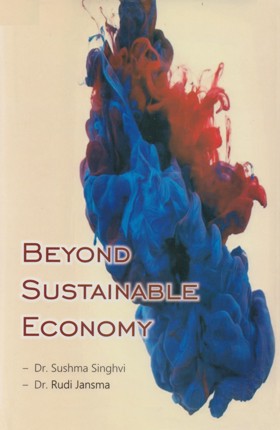Dr. Sushma Singhvi[1]
"The main object of the economics 'the welfare of the consumers' became secondary."
For the fulfillment of material demands or needs of the human being, the economics of production and consumption have not proven to be effective for the general good, universal welfare nor for the natural environment.
An economic system based on capitalism, the theory of demand and supply of competition to satisfy endless demands by limited resources have led to an ever-increasing competitiveness and consumerism between individuals, business houses and nations. Central economic policies, framed for the purpose of providing material resources, could not control corruption, misuse of power and such evils, and has led to state capitalism. In both the systems, greed created a rift that is responsible for the direct and indirect exploitation of individual and collective freedom and the modern societies were cast into the war of economics. Despite worldwide positive achievements under the parameters of development since 1940 and also despite technological development, the problem of poverty and inequality has not been resolved.
The purpose of capitalism was to make everyone happy by equal availability of capital in the society, but there are some inherent misconceptions in capitalism itself which could not be in the interest of the public good, such as: (1) there is a want of sufficient resources for all living beings on this earth and (2) competition is a necessity for increasing production (3) incentive is helpful in increasing the capital. These are the fundamental flaws in the philosophy of capitalism:
(1) Capitalism believes that nature has not provided enough resources for everyone on this earth, and based on this assumption they have defined the concept of 'scarcity'. Another misconception is that this scarcity is the basic non-avertable state of human life. This concept of scarcity psychologically gives rise to existential fear. A scared person or country tries to hoard and accumulate material possession for their survival, even by means of violence. Many studies as well as common sense have revealed that enough food and goods are produced for all, but that it is improper distribution which creates scarcity. It may be well known that even with today's world population, enough and even abundant space is available on earth to fulfill the needs of all, however the mentality of greed can not be satisfied it seems unquenchable.
(2) Capitalists believe that competition leads to a good and active social environment for a productivity, that is beneficial to consumers because it is possible for anyone to attain sufficient commodities available for sale in the market. However in the situation of today, real, honest and healthy competition is not possible in a world economic system dominated by big corporations. Medium and small trades and businesses in developing countries hardly play a role today in this system of competition. Multinational corporations often receive the benefit of tax relaxation to guarantee their place in the market, whether they may or may not be honest with regard to international and environmental standards and norms. At the national level, competition between medium and small entrepreneurs is not useful because monopolies and closed competitiveness continue to hold their control on those markets where the prices of commodity are increased at each and every level of production. This institutional, organizational and individual practice is powered by greed. By the decisions taken through proper or improper competition, not only the number of losers increases and that of winners decreases, but business itself stimulates selfishness and ego-centrism. Moreover competition leads to psychological and social imbalance and harm, while competition does not help to, but rather impedes, a person from leading a peaceful life.
As compared to competition, co-operation (a co-operative atmosphere) promotes creativity and entrepreneurship. Competitiveness gradually gets rooted in fear and aggressiveness.
(3) The third misconception of capitalism is that incentives are the best remedy for economic development, but incentives instigate greed, selfishness and the commercial tendency of merging. Commercially sick units are neither motivated nor supported but merged (absorbed). This is an impediment to one's natural desire to be generous, charitable and self-motivated. The concept of incentive works on basis of predetermined references and norms, hence suppresses creativity and opposes one's natural tendency to helping others.
So we may conclude that the best of all desired results of economics can be obtained by transforming greed based scarcity, competition and incentive to need-oriented abundance, cooperation and motivation respectively. Due to selfishness and want of spiritual values in capitalist economics, this system can, ultimately or in principle, not be useful in the world.
In Adam Smith's[2] view on economics good has been linked with goods and material prosperity has been linked to consumerism the more one can spend, the happier one is. This mistaken view has given birth to competitiveness in production and a maximum exploitation of the environment has become the definition of commercial excellence and skill. According to Adam Smith a man's conduct is selfish (self-oriented), but leads to social good by its own force. In this economic principle there is a want of universal human morality.
In J. Banthom's[3] view, individual happiness begets the happiness of all. We all love to be happy, therefore we ought to have a wish to reach that happiness. Psychological hedonism is a motivating factor for moral and individual happiness. In this way an economics based on individual profit seemed to be proved logical and with the incorporation of the psychology of happiness in it, a tendency for maximum accumulation and possessiveness arose. In order to eliminate want and poverty, maximum productivity was given much emphasis, by which consumerism came to be identical with prosperity. In the competitiveness of production education, health and even entertainment were neglected while being wealthy became the economic ideal. It became necessary for them to motivate consumers to indulge in increasing artificial needs and desires. The main object of the so-called economics 'the welfare of the consumers' became secondary. At the level of production there was no more difference between the things (products) that fulfill basic needs and the objects (products) of unnecessary consumption. The economic object became nothing but the maximum possible production and profit and linking production with employment became to be regarded as a people's good. As a result artificial needs increased and economics established that the resources are limited in relation to the needs of living beings. As such, during the industrial revolution, an economics of development and prosperity was born. After the industrial revolution the environment began to become polluted and ultimately reduced to the present most deplorable condition. Economists favor production not simply because this fulfills normal human needs but because in fact this fulfills artificial needs also, although happiness and contentment of men remained at a distance. In order to stabilize economy and for the continuation of the sales, such commodities as advertisements, publicity, expansion, marketing, salesmanship came to the scene and the fulfillment of the basic needs of common men at large became secondary.
Then came another crisis, known as inflation. There was a time when inflation occurred in the wake of war, famine, epidemic or natural disaster, but now, within the view of the economics of prosperity and affluence it is not only difficult but almost impossible to even curb inflation, and this has made the individual life of many people, notably 'the common men', miserable rather than happy. John Kenneth Galbraith has termed the principle of controlling inflation as an artificial solution. The meaning of maximum production is the nourishment of maximum artificial desires/ needs and as such, because of the demand of productions, it has become impossible to do away with inflation. Galbraith has rightly remarked about the futility of the tendency of more and more accumulation: "to furnish a barren room is one thing, to continue to crowd in furniture, until the foundation buckles is quite another."
E. J. Mishan[4], in his Economics while expressing deep concern over the concept of developmental growth and expansion, has observed that there will be no welfare by indulging into foreign exchange, export, price, etc. dealt within in-depth Economics. But after the reconsideration of the old economic model of free-marketing, growing markets and the development of economic-growth and expansion, we should pave the way for social-justice.
The multitude of options of commodities give rise to multiple choice, which is responsible for the rising of desires the one after the another, wasting time, money and mental peace resulting in non-satisfaction of desires. Economics implies that resources should yield maximum satisfaction to a person and this satisfaction should lead to social welfare.
Consumerism could not serve the purpose of sustainable social welfare: (1) through scientific and technological development, ever new alternative products are coming up, but with the production of means of comfort for a smaller groups of people in society, the claim for removing poverty of a broader society is proving false. (2) Consumerism has led to corruption, giving bribes for employment and taking bribes after getting the job: it is a vicious cycle. Consumerism is an inhuman race and the destruction of the environment is now a danger to the survival of every species of living being. The poor are exploiting the environment for want of money to fulfill their basic needs, whereas the rich are exploiting it for fulfilling their greed and luxury. The only remedy for environmental protection and successful economics seems to be to 'limit the desires'. We should learn to live with minimum (little, as per need) resources and there should be minimum exploitation of natural resources. Nature will feed us like mother's milk. More production for more consumption and profit, more exploitation of resources for more production: such more exploitation results in more environmental pollution. It is a long chain which pollutes the physical environment by exploitation of natural resources as well as social pollution by greediness for profit. In fulfilling the ever enhancing and endless desires resources will always be scarce, hence needs should be given priority and not desires, only then economics will become the means for environmental and social protection.
Emeritus Prof., Deptt. of Languages and Oriental Studies, Jain Vishva Bharati Institute (deemed University), Ladnun, Rajasthan; Director, Reseach, Prakrit Bharati Academy, Jaipur. Ex Chair Person, Rajasthan Sanskrit Academy, Deptt. of Art, Literature, Culture and Tourism, Govt. of Rajastan, Jaipur
Adam Smith (1723 -1790) was a Scottish moral philosopher, pioneer of political economy. Main works: The Theory of Moral Sentiments (1759), and An Inquiry into the Nature and Causes of the Wealth of Nations (1776). This book usually abbreviated as The Wealth of Nations, is generally considered the first modern work of economics.
Jeremy Bentham (1748 -1832) was an English philosopher, jurist, and social reformer. He is regarded as the founder of modern utilitarianism. Bentham defined as the 'fundamental axiom' of his philosophy the principle that "it is the greatest happiness of the greatest number that is the measure of right and wrong". He advocated individual and economic freedom, the separation of church and state, freedom of expression, equal rights for women, the right to divorce, and the decriminalizing of homosexual acts. He called for the abolition of slavery, the abolition of the death penalty, and the abolition of physical punishment, including that of children. He has also become known in recent years as an early advocate of animal rights (Wikipedia).
Ezra J. Mishan (1917 - 2014) was an English economist best known for his work criticizing economic growth. His seminal work is The Costs of Economic Growth (1967) In this work he stated that the "precondition of sustained growth is sustained discontent", warning developing nations that "the thorny path to industrialization leads, after all, only to the waste land of 'Subtopia'
 Dr. Rudi Jansma
Dr. Rudi Jansma
 Dr. Sushma Singhvi
Dr. Sushma Singhvi
